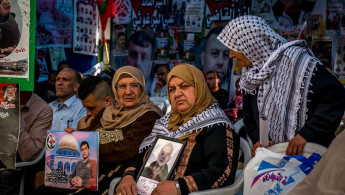1,000 Palestinian prisoners in Israeli jails go on hunger strike
One thousand Palestinian prisoners held in Israeli jails entered a collective hunger strike late on Thursday, 17 August, in protest of the "Israeli prison service's aggression against prisoners", according to a statement by the Palestinian Prisoners' Club.
The strike began at 7:00 pm local time, according to the statement signed by the 'National Emergency Committee', the united leadership body of Palestinian prisoners. The statement called on Palestinians to support the strike through protests and demonstrations.
The surprising move came hours after Israeli prison service forces raided Palestinian inmates' cells in several sections at the Negev prison. The Prisoners' Club said the raids used "excessive force" and "brutal repressive measures" against Palestinian prisoners.
The raids occurred a day after Israel's far-right security minister Itamar Ben-Gvir visited the Negev prison, in which he said that Palestinian prisoners enjoy "too much courtyard time". Ben-Gvir added that the inmates' daily one-hour courtyard time, their only chance of exposure to sunlight, "needs a way to be cut shorter", as quoted by Israeli media.
Video: Israeli National Security Minister Itamar Ben Gvir provocatively visits the Israeli prison of 'Ofer' and harasses Palestinian prisoners. pic.twitter.com/w3RlHiUkkx
— Quds News Network (@QudsNen) August 16, 2023
"This hunger strike announcement bypassed all accustomed stages and came surprisingly without any preparation or warning, which indicated the urgency of the situation in the occupation jails," Abdel Naser Farawneh, head of the research unit at the Palestinian Prisoners' affairs commission, told The New Arab.
"The Israeli occupation's current offensive on Palestinian prisoners has reached a dangerous level of aggression with the increasing practice of medical neglect, solitary confinement, continuous transfer of prisoners, reduction of life conditions and the spike of administrative detention orders," Farawneh said.
"Previous attempts to pressure the occupation authorities into halting its escalation against prisoners have failed, and the latest occupation's raid of prisoners cells in the Negev prison was the final straw," he noted. "This is a well-connected escalation against prisoners' rights, serving internal Israeli political games, and our prisoners had to stand up against it."
Palestinian human rights groups also announced Thursday that Israeli forces placed 75 Palestinian prisoners under solitary confinement following the hunger strike announcement.
More than 1000 Palestinian detainees continue their open-ended hunger strike for the first day in protest against the ongoing raids by Israeli repression units on the prisoners’ rooms in various Israeli prisons. pic.twitter.com/TeEG3zdXro
— Quds News Network (@QudsNen) August 18, 2023
Meanwhile, nine Palestinians detained without charges under the Israeli "administrative detention" system continued their hunger strikes to protest their indefinite detention renewal.
The longest-running among them is 34-year-old Kayed Fasfus, who has been refusing food for 15 days. Fasfus was detained in May and given a six-month detention order without charges by an Israeli military court.
In 2021, Fasfus was released from a months-long administrative detention following a 131-day-long individual hunger strike.
Earlier this year, Palestinian detainee Khader Adnan died at an Israeli hospital on the 87th day of his sixth hunger strike since 2011, protesting his repeated administrative detention. A quarter of all 5,100 Palestinian prisoners are administrative detainees held without charges under renewable detention orders.
Since 1967, over one million Palestinians have been arrested by Israeli forces, making up a third of the Palestinian population in the occupied West Bank, Gaza and Jerusalem, according to human rights groups.





 Follow the Middle East's top stories in English at The New Arab on Google News
Follow the Middle East's top stories in English at The New Arab on Google News


